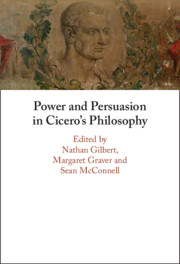Book contents
- Power and Persuasion in Cicero’s Philosophy
- Power and Persuasion in Cicero’s Philosophy
- Copyright page
- Contents
- Contributors
- Note on Texts and Translations
- Introduction
- Part I Techniques and Tactics of Ciceronian Philosophy
- Chapter 1 Cicero on Rhetoric and Dialectic
- Chapter 2 Cicero’s Platonic Dialogues
- Chapter 3 Mos dialogorum
- Chapter 4 Nos in diem vivimus
- Chapter 5 Cicero the Philosopher at Work
- Part II Political Philosophy and Ethics
- References
- Index Locorum
- General Index
Chapter 5 - Cicero the Philosopher at Work
The Genesis and Execution of De officiis 3
from Part I - Techniques and Tactics of Ciceronian Philosophy
Published online by Cambridge University Press: 15 January 2023
- Power and Persuasion in Cicero’s Philosophy
- Power and Persuasion in Cicero’s Philosophy
- Copyright page
- Contents
- Contributors
- Note on Texts and Translations
- Introduction
- Part I Techniques and Tactics of Ciceronian Philosophy
- Chapter 1 Cicero on Rhetoric and Dialectic
- Chapter 2 Cicero’s Platonic Dialogues
- Chapter 3 Mos dialogorum
- Chapter 4 Nos in diem vivimus
- Chapter 5 Cicero the Philosopher at Work
- Part II Political Philosophy and Ethics
- References
- Index Locorum
- General Index
Summary
In the chapter I argue that we should set aside the Quellenforschung arguments of Lefèvre and Brunt and Atkins and others and look at what Cicero is up to in book 3, where he aims to fill in a gap left by Panaetius and not followed up by Posidonius. My analysis focuses in particular on Cicero’s redeployment of the Ring of Gyges thought experiment to undercut the Epicurean reliance on Kuria Doxa (KD) 5 to bolster their ‘moral’ hedonism; and the critical role, or so I argue, of the correspondence with Cassius (which cites KD 5 in Fam 15.19) in the development of Cicero’s argument (with additional reference to Fin. 1-2, where KD 5 also takes a critical role). In addition to making the case for the importance of the correspondence as ‘work in progress’, I argue that Cicero’s engagement with Posidonius, Panaetius et al. represents a mature, confident Cicero philosophus, ready to make a targeted contribution to Stoic ethics, with none of the dissimulatio doctrinae of the works of the 50s.
- Type
- Chapter
- Information
- Power and Persuasion in Cicero's Philosophy , pp. 97 - 116Publisher: Cambridge University PressPrint publication year: 2023
- 1
- Cited by

